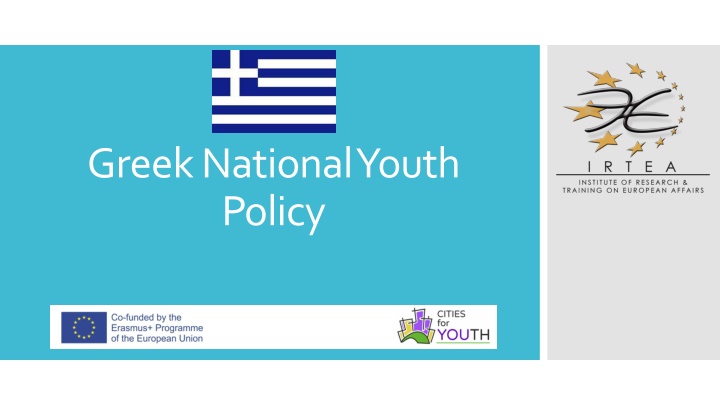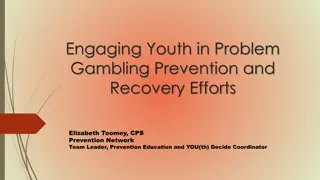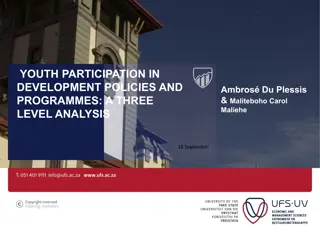Challenges Faced by Greek Youth in Employment and Society
The Greek National Youth Policy highlights the lack of a clear definition of youth in Greece, with different age ranges identified by various sources. High unemployment rates, limited job opportunities, and economic uncertainty contribute to youth feeling disillusioned and pessimistic about the future. Family support plays a crucial role due to the challenging transitional paths to adulthood. Trust in public authorities is low, with many young people expressing willingness to engage in alternative forms of participation, such as protests and online communities.
Download Presentation

Please find below an Image/Link to download the presentation.
The content on the website is provided AS IS for your information and personal use only. It may not be sold, licensed, or shared on other websites without obtaining consent from the author.If you encounter any issues during the download, it is possible that the publisher has removed the file from their server.
You are allowed to download the files provided on this website for personal or commercial use, subject to the condition that they are used lawfully. All files are the property of their respective owners.
The content on the website is provided AS IS for your information and personal use only. It may not be sold, licensed, or shared on other websites without obtaining consent from the author.
E N D
Presentation Transcript
Greek National Youth Policy
According to available data, the concept of youth is not clearly defined in Greece. While the National Report states that, in line with the EU standards, youth represents that part of the Greek population aged between 15 and 29, the European Knowledge Centre for Youth Country sheet (2012) emphasizes that youth policy in Greece is targeting young people aged 15 35 years. In some cases, such as young farmers for example, the age limit extends upto 40, while statisticaldefinitionsof youth varies between15-24,and15-30. At the same time, following wider European and international trends, the youth population in Greece is not an homogeneous group but rather diverse according to social, economic, ethnic, religious, and other criteria. The main problem faced both by the overall population and by young people themselves is unemployment(23%and59% respectively) Young people in Greece In addition, 69.8% of the sample surveyed said that things in their lives are not so good and that they feel disappointment, disbelief, fear, fatigue and pessimism about the future. The priorities of the new generation of Greeks are, therefore, to find work, education, professional development and financial rewards. Additionally, 65% of young people surveyed said that it is not possible to fulfil their dreams and their professional goals inside the country. Adopting a negative attitude towards opportunities for the development of business in Greece, 89.1% of young people believe that there is no future for business in the country. Finally, their perspective on the evolution of Greece in the future is also quite pessimistic and expressed withthe words like crisis (70.8%), claimingthat the worst isyet tocome (73.8%). NR(p.52)
As a result of limited employment opportunities, young people in Greece face many obstacles along their transitional trajectories to adulthood in times of economic crisis, often remaining dependent on their families. Uncertainty, inequality, and exclusion among young people is increasing. It is not surprising, therefore, that the family (still) represents the most important value (51%), and probably the main source of support for a majority of contemporary youth in Greece (NR, p.53), making it one of the most familial countries in Europe, in terms of both cultureandsocialpolicy. At the same time, young people represent the most vulnerable group in the labour market in Greece. While the National Report (p.52) shows that the most important features that working young people seek from their jobs are safety (permanency) and economic comfort (money), paradoxically, they are often forced to accept jobs with an uncertain future, low wages, temporary contracts, and without (sufficient) social insurance. This uncertainty influences negativelytheautonomyandthe independenceof youngpeople. Young people in Greece Furthermore, although there are no available data on the impact of the crisis on the mental health of the youth population in Greece, experts (Kolaitis 2013) stress that: ... it is well known that in periods of crisis, children and adolescents can be affected because their parents may adoptaless supportiveandwithout control attitudetowards their offspring . Finally, the National Report records that 45.8% of young people do not trust any public authority that is supposed to defend the interests of their generation. The percentage of youth that declares trust in political parties, trade unions, politicians, and students political parties is very low. On the other hand, 78.1% of respondents said that young people are willing to organise and express themselves in alternative ways of participation such as protest- marches, strikes, or online communities. Reflecting on the broader European trends, trust in key public institutions, governments and parliaments has fallen over the past five years, but it is significant to note that the largest declines are most obvious in those countries facing the mostseriouseconomic difficulties,suchasSpainandGreece.
No institutional definition and recognition but youth work does exist as a social practice. It constitutes an integral part of educational and welfare work and plays a role in supporting young people s safe and healthy transition to adult life(yet remaining mainly leisure-timeactivities). To some extent, there is already a sense of an emergent youth work profession that, if facilitated properly, could have a transformative effect in working for, with and about the energisation and engagement of youth inGreece - the recognitionand visibilityof youth work remain key issues. Youth Work No tradition of monitoring and documentation of youth work (know - how), and there are also many uncertainties regarding concepts and indicators. Professionals involved in youth work - not satisfied with the current status of this field. In particular, they believe that youth work services should assume a more prominent and comprehensive role in Greek society and that more coordinated efforts should be made in this direction.
The youth related policies in Greece are centralized, based on a top-down approach, weak links between national regional, and inter-regional layers. COVERAGE (geographical areas, social groups, policy domains) A step in the right direction was the recent reform of the administrative system, towards delegating authority for youth policy development and implementation to the lower layers (regional and local). The main challenge (especially at the local level): to address and overcome differences and establish new integrated forms of governance among merged municipalities, and to develop co-operation with other newly established municipalities (having in mind the constraints of their budgets), but also with respective national governing structures.
The labour market conditions in Greece have deteriorated significantly during the global economic crisis, and young people are among the most disadvantaged groups. Improving the performance of youth on the labour market is a crucial challenge in most of the EU member states facing persistent youth unemployment, including Greece. Youth employment Root causes of youth unemployment in Greece: the overall economic situation and the labour market environment (in line with the EU trends), early school leaving, lack of qualifications, lack of work experience, and lack of relevant skills skills mismatches. This confirms the international literature which consistently suggests that the primary factor influencing youth unemployment is the overall economic context rather than characteristics of young people themselves.
The risks of a delayed process of transition to the labour market have a severe impact on the life projects of young people in Greece (and across Europe) in the long-run, as it does affect their access to social security schemes, professional development and, notleast, their self-esteem and resilience. Ensuring a good start for youth on the labour market will require co-coordinated policies to bring the education system closer to the labour market, to help disadvantaged youth to find a job or participate in a training course, and to facilitate the hiring of young people by firms. The Greek government has introduced various policy responses, taking into account both the EU trends and the national strategic priorities, focusing on areas of youth entrepreneurship, and agriculture (especially in the framework of the NSRF (2007 2013)). To combat youth unemployment the proposed measures were mainly twofold: to incentivise employers to recruit young people (through various subsidies), and to support entrepreneurial start-up by young people.
The unemployment in Greece appear to have been based on top- down approaches. majority of policy interventions targeting youth Policy measures are implemented by various public institutions; there seem to be no obvious links, coherence, and coordination of these programmes, while their efficiency and effectiveness oftenremains unknown.
The topic of youth entrepreneurship - high priority on the political agenda in order to fight youthunemployment. Though there is an impressively high number of programmes and initiatives implemented in the field of youth entrepreneurship, these are largely divorced from the real needs and the wider social and economic realities of young people s lives, requiring more incorporation and focus if effective strategies are to be developed and implemented. Youth entrepreneurship A general impression conveyed by many respondents that youth entrepreneurship still represents an experimental area of programming, relying more on a trial and error principle than on any robust evidence. Current public policies for youth entrepreneurship in Greece are probably based on good intentions, but face difficult operational challenges.
The Greek education and training system faces various challenges in terms of its quality, efficiency and capacity to ensure asuccessfultransitionofyoung peopletoemployment. The main challenges lie in the need to ensure wider access, to improve equity and to address geographic disparities, as well as to enhance the quality, attractiveness and relevance of VET to the labour market. Making serious progress in improving the educational situation of disadvantaged groups, including migrants andRoma,wasrecognizedasanotherpriority. Due to decreased public spending and budgetary cuts, it is more likely that the effective implementation of systemic reforms in the area of education and its relation to the labour market will remain the key issue in the Greek context. Having in mind low public investment in education and training in times of economic crisis, the achievement of the national targets will be somewhat difficult. Linking education labour market
A lack of evident overall strategic vision to provide purpose and direction to the long-term future of the Greek society/economy, as well as for the short- medium- and long-term measures to be implemented A low level of co-ordination between and within ministries, causing evident fragmentation and overlaps among structures and task, The weak implementation of policies and reforms, as a result of a combination of weak central supervision and a culture that favours regulatory production over results, Greek public governance An urgency for human resource management reform in order to strengthen the civil service and promote mobility Shortcomings in data collection and management which stand in the way of effective and evidence-based reforms The complexity of a legal framework based on a culture of legal formalism which discourages initiative, puts the focus on processes rather than policy, and blocks reform progress, Alack of transparency and accountability when it comes to budget management.
One of the main obstacles to efficient and effective policy responses to complex issues that young people are facing in contemporary Greece is the absence of an integrated youth policy, as well as any joint vision, any sense of purpose, or coherent cross-departmental strategy in the youthfield. Attempts to develop the platform for the local youth policy are clearly random and lean mainly on the local strategy for civil society, even though that does not specifically target young people. These efforts are based on the central European model of municipal engagement and partnership with civil society (as in Thessaloniki for example). Strategic framework and vision Key challenge: to establish mechanisms that can release the entrepreneurial and participative spirit of young people, to give them hope and belief in their futures and in their country, but also of regional and local administrations, youth organisations and local youth councils, so that these can provide timely and purposeful intervention and support, and innovation, according to local need and circumstances.
There is a significant absence of knowledge management in the youth field in Greece which is further linked to the fact that reform strategies probably lack a strong evidence base to supporteffective and efficient policy decisions. A knowledge gap is mainly reflected in the lack of any sociological or anthropological studies of youth, despite it being widely recognized that social research is a key tool to inform policy propositions - existing fragmented university research in Greece is often disconnected from any policy debate, and linked with the low level of engagement of researchers in programmes and projects directed at youth. Evidence base approach The questions about the communication channels between researchers and policy formulation, development and implementation, as well as review and evaluation.
The youth field in Greece - well regulated, although an integrated legal act regulating youthpolicy inGreece does not exist. Administrative processes appear to be more important than substantive policy action in Greece - laws, regulations and formal processes shape the work of the public administration, leaving little room for effective policy making, innovation and incentives related toit. Legislation Legal formalism - originally established to secure integrity and protect against political interference, but over time produced inefficiency, blocking innovation, initiative, and entrepreneurial spirit.
Relations between the central administration and the rest of the public sector needs further attention - despite claims to the contrary, there was little evidence that youthpolicy inGreece has any meaningful cross-sectorial dimension. A lack of cross-sectorial collaboration, coherence and coordination in implementing programmes and projects targeted at youth. Not clear to what extent the balance between top-down and bottom up approaches has been established, and what mechanisms have been created to secure sustainability in the implementation of youthrelated policies and initiatives. Co-ordination (Co-operation, co-ordination and coherence) The elements of youth policy in Greece represent more a range of services for youth rather than a horizontal policy, based on proposals and approaches from different quarters and the dissemination of those policies, but not an integrated approach to youthissues.
The youth policy report (2012) notes that no national youth policy nor youth strategy exists. Instead, youth policy is considered cross-sectoral with youth affairs legislated across various ministries and incorporating national, European and international policies. Numerous laws cover youth issues such as education, employment, sports, family, rights, health, social protections, and local youth councils. The General Secretariat for Youth, which has responsibility for youth affairs, focuses on three main policy areas: 1) unemployment, employment and labour relationships; 2) social exclusion, social inclusion, youth rights and participation; 3) environment, climate change and green development. National youth programmes are influenced bythe EUYouthStrategy(2010- 2018). Policy & Legislation
The General Secretariat for Youth (GSfY) within the Ministry of Education & Religious Affairs has the primary task of shaping, monitoring and coordinating the government policy for youth. The youth policy briefing (2012) notes that the main role of the GSfY is to promote a cross-sectoral youth policy and heads an inter-ministerial committee. According to the youth policy report (2012), a Youth Committee cooperates with non-governmental organisations, social and scientific bodies before making and implementingthe youthpolicy. Public Institutions
The National Youth Council of Greece (ESYN) is an umbrella organization with 59 affiliated members. It is an independent, non-governmental, non-profit organizations. According to the youth policy briefing (2012), the ESYN was established in 1998 and its role is to be the official representative of Greek youth at international forums and to act as the main interlocutor between the Government and young people on youth issues at the national level. The ESYN is a member of the European Youth Forum and the Mediterranean YouthForum. federation of Greek youth Youth and Representation
The youth policy briefing (2012) notes the regular budget of the General Secretariat for Youth for 2012 as EUR 2.9 million (USD 3.9 million). It notes an additional Public Investments Programme under the General Secretariat for Youth with a budget of EUR 2 million (USD 2.75 million). However, it is unclear what this budget specifically refers to. According to the World Bank, Greece spent 9.22% of its government expenditure and 4.09% of its GDP on education provisionin2005. Budget & Spending
The Institute of Research & Training on European Affairs I.R.T.E.A. Office: Favierou 39, 104 38, Athens, Greece Phone:(+30) 2130250217 Email:irtea.greece@gmail.com Website: www.irtea.gr Facebook: @I.R.T.E.Agr























